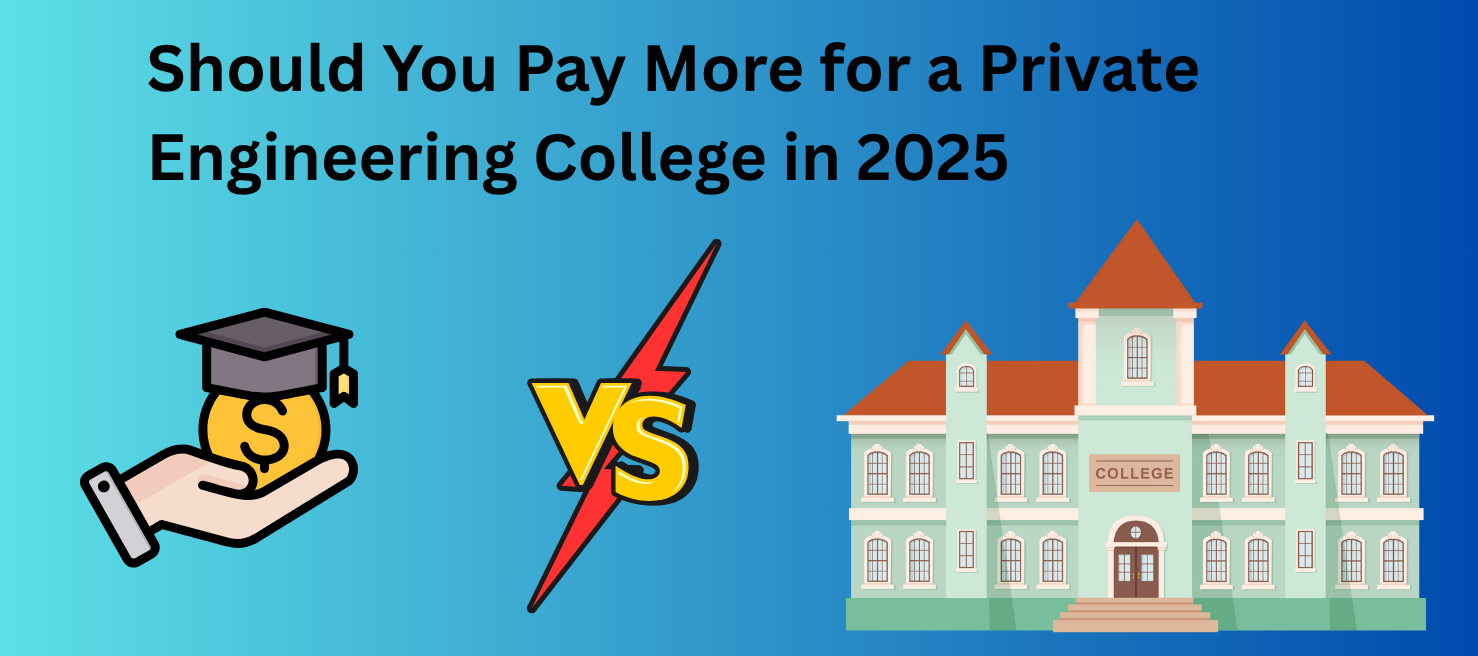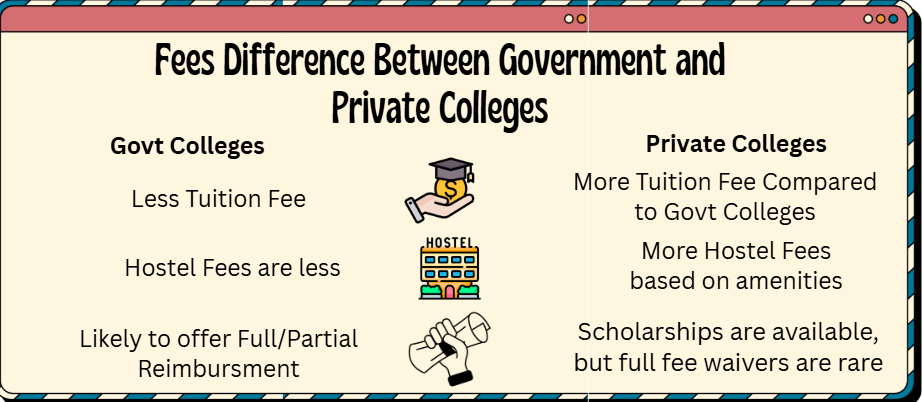
According to the AICTE, there are a total of 8,876 engineering colleges in the country, with 6,611 being private and 2,265 being government institutions. However, these statistics have not always been this way. The rapid expansion of private engineering colleges can be primarily attributed to the limited number of seats in government institutions, which have not been able to keep pace with the increasing number of students passing class 12 and seeking options in engineering.
While private Colleges may have bridged the gap between the high demand for engineering education and the limited seats available, they are often perceived as having flashy campuses and air-conditioned rooms, with a marketing-heavy appeal and viewed as inferior in terms of faculty and curriculum compared to top-tier government colleges.
The current landscape of engineering has, however, changed significantly over the last few years. Private institutions have increasingly filled the gap in terms of both vacancies and the quality of education, often offering packages that rival those of top-tier government colleges. As a result, the modern perception of private colleges is shifting, with more of them being seen as comparable to government colleges in terms of providing an excellent academic experience. These private colleges now offer premium facilities, including high-tech labs, advanced tools, smart classrooms, and high-quality hostel accommodations.
However, in their competition to attract students, many private institutions have started providing expensive amenities that are often deemed unnecessary. Meanwhile, government Colleges continue to deliver solid education, supported by experienced faculty and infrastructure tailored to student needs.
Considering the growing trend of private colleges to attract students, it’s essential to question what you’re truly receiving for the extra fees. Are these colleges offering advantages that a government college can’t provide? Students need to evaluate the “worth” of their investment by understanding whether they need all those add-ons or not!
Ultimately, it won’t be the size of the campus that defines success, but the clarity of one’s choice and how they make the most of it. As you read this blog, we will focus on what truly matters when choosing between a private and a government engineering college. How to look beyond branding and marketing claims? How to assess the quality of education, faculty expertise, and the overall academic environment? How to weigh the premium amenities against their real value in enhancing your learning experience? And finally, how well each institution aligns with your personal and professional goals.
Why Private Colleges Have Gained More Ground in the Engineering Space in Recent Times
According to the official reports of the All India Survey of Higher Education (AISHE), the number of private Colleges increased to 47% from 2015 to 2020. Several factors, such as the demand for higher education, balancing the regional imbalances, and diverse courses and specialisations, contributed to the boom in engineering colleges across India. Let’s understand what the key factors are behind the boom in engineering space.
The Numbers Don’t Lie: 90 %+ Students Can’t Get into Top Govt Colleges.
As per the NTAs official data, over 2.5 lakh students appeared for JEE Advanced. Only 30% of people qualify for the exam, and the acceptance rate at a top Government engineering college is less than 1%. This illustrates the intense competition among students for engineering education. This highlights the uncertainty of selection, and there is a strong chance that even many top students might miss the opportunity to secure a seat in top Colleges due to a tough exam shift, hard luck or, as a matter of fact, the intense competition among students.
Private Colleges Bridged the Demand Gap
With the number of Private Colleges rising following the liberalisation of education policies. Private Colleges boomed to fill the gap between the demand for higher education and the limited number of vacancies.
Many private engineering colleges have invested heavily in infrastructure, offering students a world-class education that combines great academic experience with the amenities of private Colleges. Government standardised ranking with NIRF, NAAC, NBA, AICTE, and allowing private Colleges to admit students through common entrance tests has helped a lot in expanding Private colleges in almost every major city in India.
Many Private Colleges Now Offer Serious Value
In recent times, while tier-1 government colleges, such as IITs and NIITs, have maintained their standards in terms of quality, the scenario for tier-2 and tier-3 government colleges has been declining for some time. In the wake of this decline, many private Colleges have filled the gap by offering diverse courses and specialisations tailored to emerging fields, catering to students with different interests. With flexible innovation options among the course offerings and teaching methods,
Private Colleges include smart teaching methods, practical learning options and higher placement opportunities than. Moreover, with its strong industry connections due to investments from several companies in the college itself, private colleges are striving to place their students in core jobs with high salaries.
Fees Difference Between Government and Private Colleges
Coming to the most important part of the blog, let’s try to understand what you’re truly receiving for the extra fees. At a glance, you can see that there is a significant difference in the fees charged by the government and private Colleges, but it’s not without a reason. Government institutions receive subsidies from the state and central governments, which help them to keep the tuition and other fees relatively low compared to those of private institutions.
Private Colleges often operate independently and rely on the fees paid by the students to cover operational, infrastructural and marketing costs. This often translates into higher tuition and other fees, even if the quality of the education is comparable.
While some private colleges genuinely offer better labs, tech-enabled classrooms, or industry exposure, many simply package the basics in a more appealing manner or put extra efforts into marketing rather than improving the actual quality. In such cases, students and parents must ask: Are these additional facilities truly essential for learning, or just appealing add-ons?
Here’s a table explaining different costs levied by the government and private Colleges.

| Aspect | Government Colleges | Private Colleges |
| Tuition Fees (Annual) | ₹20,000 – ₹2,00,000 (varies by state and College) | ₹1,00,000 – ₹3,50,000 (can go higher for top Colleges) |
| Hostel Fees (Annual) | ₹10,000 – ₹1,00,000 (varies by location) | ₹30,000 – ₹1,50,000 (modern amenities cost more) |
| Examination Fees | ₹2,000 – ₹5,000 | ₹5,000 – ₹10,000 |
| Miscellaneous Fees | ₹1,000 – ₹5,000 | ₹5,000 – ₹15,000 |
| Total Fees (Per Year) | ₹30,000 – ₹2,10,000 | ₹1,35,000 – ₹4,00,000 |
Note: The figures might vary based on the location and reputation of the colleges.
Understanding the Cost Gap – What Are You Actually Paying For?
Students and parents are often surprised by the charges levied by private engineering colleges in India. It is essential to understand the Cost Gap before making a decision that impacts not only your finances but also your future. Here are some of the key factors mentioned below to help you understand what you are being charged for.
Curriculum Relevance
Now it’s true that for ongoing curricula that have been there for close to a few decades, government Colleges still have a better understanding and better-structured curricula, however when it comes to modern concepts of AI, robotics and Machine learning, private colleges have shown a greater flexibility in terms of adapting to the curriculum, using new teaching methods, and seperaate course. Private colleges have the flexibility to introduce industry-relevant courses, as they have greater autonomy.
At the same time, the process of upgrading the curriculum at government institutions involves complex and lengthy academic approvals and regulatory delays.. In today’s fast-paced job market, that ability to adapt quickly gives private Colleges a clear edge in keeping students future-ready.
Faculty and Teaching Quality
Government colleges have more experienced faculty with strong academic credentials. Honestly, it’s quite prestigious since it’s tough to secure a professor position at a top-tier government engineering college. However, this results in the recruitment cycles being slow, and even the training sessions offered to teachers are slow due to lengthy government procedures.
However, in order to attract and ensure students learn from the best mentors, private engineering colleges often directly hire talented people with industry experience by offering higher packages without any particular all-India exams. This ensures students learn from the best mentors who provide valuable insights and real-world applications of the learned concepts. This bridges the gap between theoretical knowledge and practical skills, enabling students to gain a competitive edge in the job market.
Labs and Hands-On Learning
Labs are an essential resource that provides hands-on experience, fosters critical thinking and enables experimentation. Government Colleges do provide high-tech laboratory facilities, but in order to get new machines quickly, multiple levels of approval and other procedures make it cumbersome. However, private engineering colleges have the proper funding and flexibility to develop the infrastructure, including labs, libraries, etc. This gives the scope for students to explore, innovate and learn the concepts better. However, it could be a possibility that these facilities are underused, and eleven might not align with your target field or aspirations
Alumni Network and Competition
A strong alumni network highlights the college’s success in producing individuals who excel in their careers and contribute to various industries and innovations. Many aspire to gain admission to prestigious institutions like the IITs and NITs. However, it can be disheartening to think that a single bad exam day, a minor mistake, or other factors might prevent you from attending these schools. But does that mean you’ll miss out on networking opportunities with top IIT graduates?
NO! Private Colleges have cracked the problem here. With their strong connections, they attract a diverse pool of students from across the country and abroad, who bring varied academic strengths, aspirations, and perspectives.
This diversity fosters healthy competition, cultural exchange, and a vibrant learning environment.
So, while you may think the peer group may be more elite in government Colleges, top private colleges have managed to create a space through regular alumni meetups where motivated students can connect with IITians, industry experts, and CEOs to thrive, collaborate, and grow just as effectively. These networking opportunities for students are often converted into chances for internships and job opportunities.
Campus Culture and Student-Driven Initiatives
While performing in academics is important, it is also critical to ensure that your campus life offers you an enriching experience. However, in this aspect, both Private and government Colleges ensure students get a competitive edge among others with concepts like student-driven bodies, launching projects, startups, tech fests, etc. They also have the regulating bodies to ensure students learn concepts along with real-world challenges, instead of just memorising. These initiatives also promote leadership, communication, and confidence required to lead the present.
Industry Exposure and Career Readiness
Internships help students understand how organisations work and provide networking opportunities, and give a strong foundation to get into the corporate arena. Government colleges offer better internship and placement opportunities for students in established fields like software developers, back-end, front-end developers, and product management
However, for new-age technologies, such as AI, Machine learning and Cloud computing, Private engineering colleges have been performing better. With a strong placement cell, support is provided to students undergoing CRT training to prepare them for recruitment processes, including resume-building sessions and interview preparation. By focusing on skill development for new-age technologies and industry readiness, the placement cell helps students become “product-company-ready,” boosting their chances of securing high-paying, competitive positions in the new era of technology.
Tuition, Hostel, and “Hidden” Costs
It’s easy to get attracted to big campuses, luxury hostels, and premium services. But it is important to ask: Do I really need all these to succeed? Private colleges charge exceptionally higher fees to cover their infrastructure, branding, and operational expenses.
To be honest, in terms of critical facilities such as well-equipped labs, access to industry mentors, and placement support, attending industry fairs, the cost can be justified, but hostel prices can be a little pricier because of better ambience and amenities like Fancy cafeterias, total AC buildings, or high-end recreation centres.
Although these facilities are going to be the new normal, one should consider and evaluate whether the added cost translates to real value. Here, check out the additional costs associated with each college from the following table:
| Category | Government Colleges | Private Colleges |
| Hostel Fees | ₹10,000 – ₹30,000 per year (basic shared rooms) | ₹80,000 – ₹2 lakh+ per year (AC rooms, private/shared with premium facilities) |
| Cafeteria/Dining | Basic mess (₹1,500 – ₹3,000/month) | Premium dining halls with multiple cuisines and cafes (₹3,000 – ₹8,000/month) |
| AC & Infrastructure Costs | Mostly non-AC, functional classrooms & labs | Fully air-conditioned campuses with designer lounges, modern architecture |
| Recreation Facilities | Limited (basic gym, playgrounds) | High-end gyms, swimming pools, gaming zones, music & dance studios |
| Technology/Smart Campus Fees | Basic digital infrastructure | Smart ID systems, e-campus portals, tech-enabled classrooms (often charged separately) |
| Industry Exposure Support | Minimal or subsidised industrial visits | Branded industrial tours, start-up incubators, hackathons (often with added fees) |
Return on Investment (ROI)
In real life, return on investment (ROI) goes far beyond just getting a high package offer after graduation. It’s about the overall experience and value you receive for the time, effort, and money you put in. A college that offers a productive environment, strong placement support, relevant training, and solid industry connections can provide a much better ROI, even if the fee is slightly higher. The real question is not just how much you pay, but what you truly gain in return.
Colleges that encourage hands-on learning through real-world projects, coding competitions, and internships help students become job-ready from day one. Moreover, a supportive alumni network, soft skills development, and opportunities to lead or participate in events and clubs contribute massively to personal and professional growth, and should be the priority regardless of branding.
These experiences are what employers look for, not just grades. The more your college helps you bridge the gap between academics and industry expectations, the higher your long-term career value becomes. At the end of the day, ROI isn’t just about the first paycheque; it’s about how your college sets you up for consistent success, confidence, and career progression.
How to Make the Right Choice – A Decision Framework
Making the correct choice of deciding to choose a government college or a private engineering college is often overwhelming. To address this common concern among students, we have taken insights from the professors, students and parents and enlisted a step-by-step process on how to make the right choice while selecting a college:
Step 1 – List Your Priorities (Career, Learning Style, Budget, Location)
List out your priorities before choosing to join an engineering college. Note down your budget, learning style, career prospects, location, transportation, etc.
Here’s an example of how to do it:
Priority Checklist
- Career Focus: Want strong placement support and internship opportunities in software development or AI-related roles
- Learning Style: Prefer hands-on learning with real-world projects, labs, and mentorship
- Budget: Maximum ₹8–10 Lakhs for the entire course, including hostel
- Location Preference: Do you prefer a particular region in India, or maybe somewhere near to your home
- Transportation: Should be well-connected by road/train for occasional home visits
- Campus Environment: Looking for a college with good peer culture, student clubs, and growth opportunities
- Reputation: Prefer colleges with consistent placement records and industry recognition
Step 2 – Visit the Campuses, Ask These Questions
After listing all your priorities, ensure that you make a personal visit to the campus with your parents or guardians. This can help you interact with the faculty, students, and concerned authorities for their opinions about the campus. This can also help you to have a look at the campus life of the students and the available facilities on the campus. Ask the following questions after visiting the campus:
- What is the placement record for my course, and which companies regularly visit the campus for recruitment?
- Can you provide information on internship opportunities and how the college supports students in securing internships?
- What is the faculty-to-student ratio, and how accessible are professors for guidance and mentoring?
- What are the infrastructure facilities available, such as labs, libraries, and online learning resources?
- How does the college support the overall development of students through extracurricular activities, clubs, and sports?
- What are the hostel accommodations like, and what is the quality of food and living facilities?
- Can you provide details on the scholarships and financial aid programs available for students?
- What types of industry collaborations and research opportunities are available in my field of study?
- How active is the alumni network, and do they assist with career placements and mentoring?
- What is the process for academic support, including tutoring, counselling, and help with struggling subjects?
Step 3 – Talk to Students and Alumni
A personal visit to the campus is a great way to connect with current students and get a sense of the environment. Ask them about their experiences; they’ve lived through the system and can offer insights into both the strengths and shortcomings of the college you’re considering. Keep in mind that some students may naturally present a more favourable view due to their association with the College, so try to speak to multiple people and ask specific, experience-based questions for a well-rounded perspective.
Step 4 – Compare Using a Smart Scorecard
systematically evaluate multiple colleges side-by-side using a set of weighted criteria. A smart scorecard template typically includes columns for key factors such as Fees, Faculty Quality, Placement Records, Labs and Infrastructure, Campus Culture, and Peer Quality. By assigning scores to each category based on your preferences and priorities, you can easily compare different options. A downloadable college scorecard template provides a checklist with 10 weighted criteria, helping students assess and rank colleges. This approach allows for a more objective, data-driven decision-making process, ensuring you choose the best fit for your academic and personal goals.
Step 5 – Trust Logic + Gut
Gut instinct and logic can help you in making an informed choice about the engineering college. This ensures you are clear about your future prospects and are making a decision that aligns with your long-term goals. Combine your gut instinct with the college’s reputation, placement opportunities, and quality of the faculty to ensure that your choice fulfils all your academic needs and supports your career aspirations.
Conclusion – Pay for Value, Not Just Vanity
When choosing an engineering college, focus on the value it offers rather than just the prestige it holds on paper. A good college should provide you with the tools to be future-ready, offering not just a degree but real-world skills, internships, and a strong placement record. It’s important to consider factors like faculty quality, industry exposure, campus culture, and overall support for personal and professional growth. While rankings and reputation matter, they shouldn’t be the sole factors in your decision. Prioritise a college that genuinely prepares you for success in your career.
Frequently Asked Questions
1. Is paying more for a private engineering college worth it?
It depends on the value offered. If the private college provides strong placements, modern labs, industry connections, and hands-on learning, it could be worth the extra fee.
2. Do private colleges offer better placements than government colleges?
Top government colleges (IITs, NITs) still dominate. But many private colleges now match or exceed tier-2 govt colleges in placements, especially in emerging fields like AI, ML, and Data Science.
3. Are government colleges always cheaper than private ones?
Yes. Government colleges are subsidized and have lower tuition and hostel fees. Private colleges charge more to cover infrastructure, faculty salaries, and marketing costs.
4. What should I look beyond branding and fancy infrastructure?
Check Focus on curriculum relevance, teaching quality, lab access, placement track record, and mentorship opportunities, these matter more than just AC rooms or designer lounges.
5. Are scholarships available in private colleges?
Definitely. Many private colleges offer merit-based, need-based, and entrance exam-based scholarships covering up to 100% of fees
6. Do private colleges have good faculty?
Many hire experienced industry professionals and PhDs at competitive salaries. While govt college faculty may be more qualified on paper, private college teaching is often more industry-relevant and practical.
7. Should I choose based on ROI or college name?
ROI is more important. A college that helps you become job-ready, build skills, and get placed well, even if it is lesser-known, offers better long-term returns than a famous name with outdated systems.






